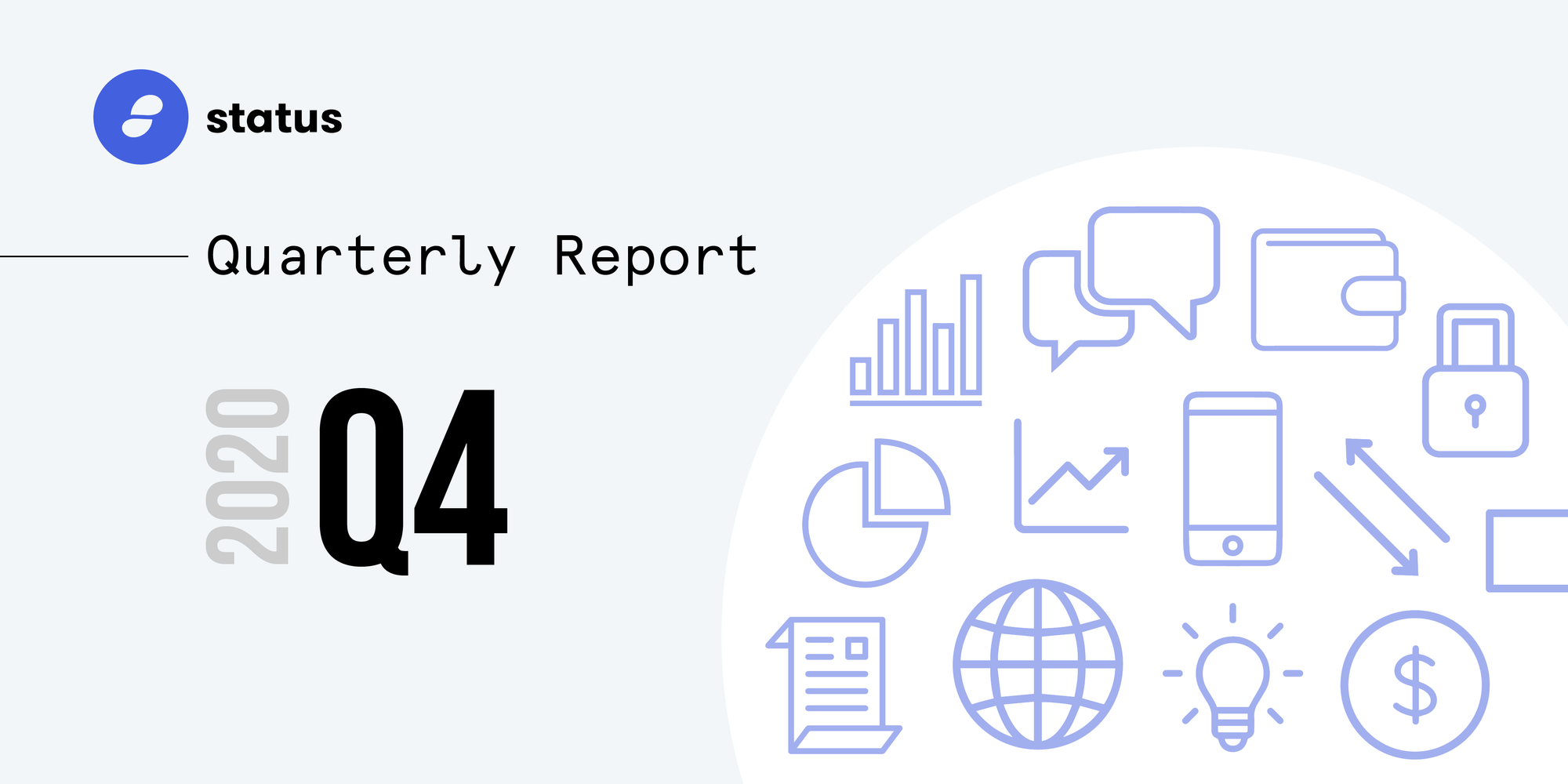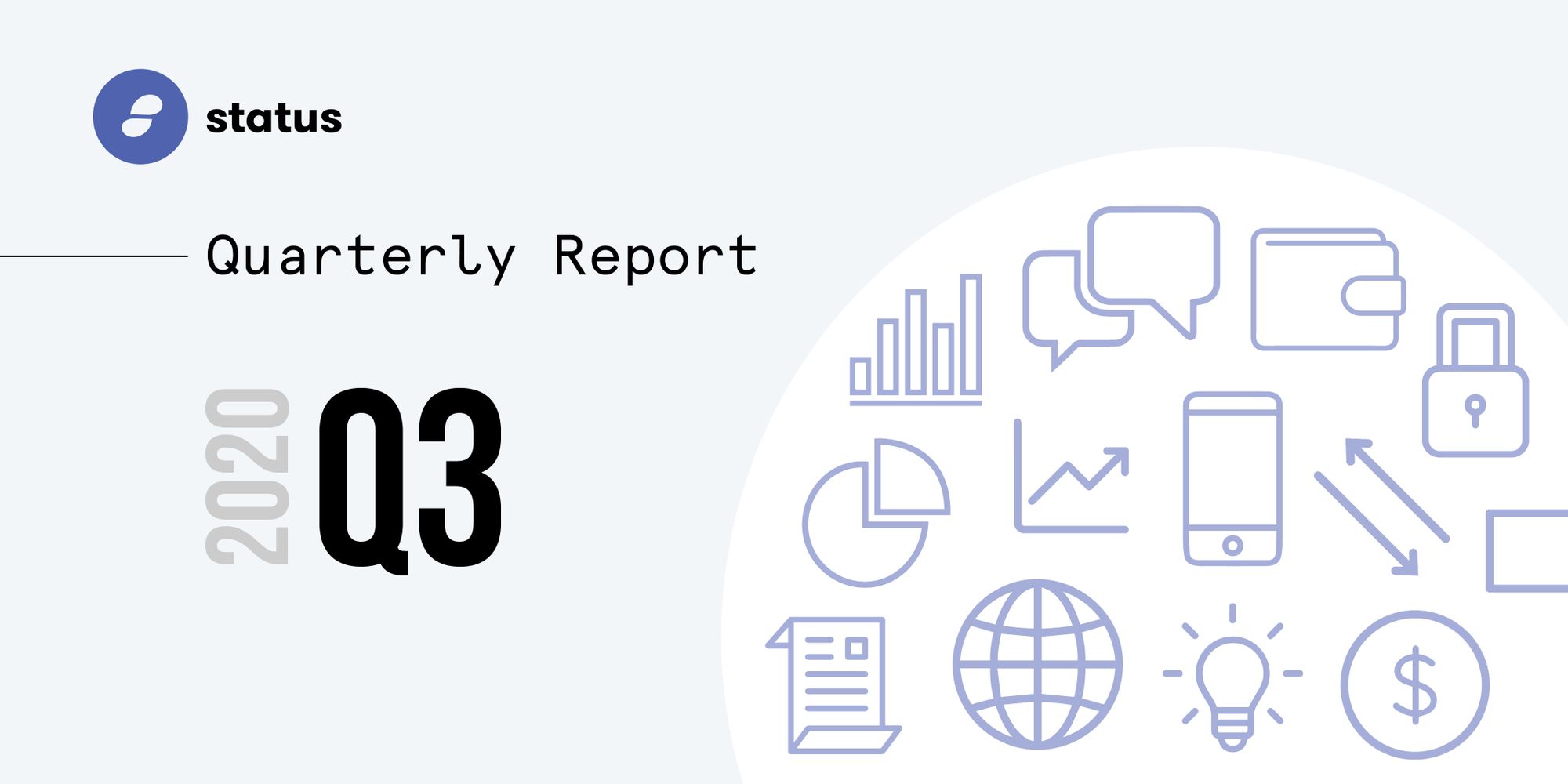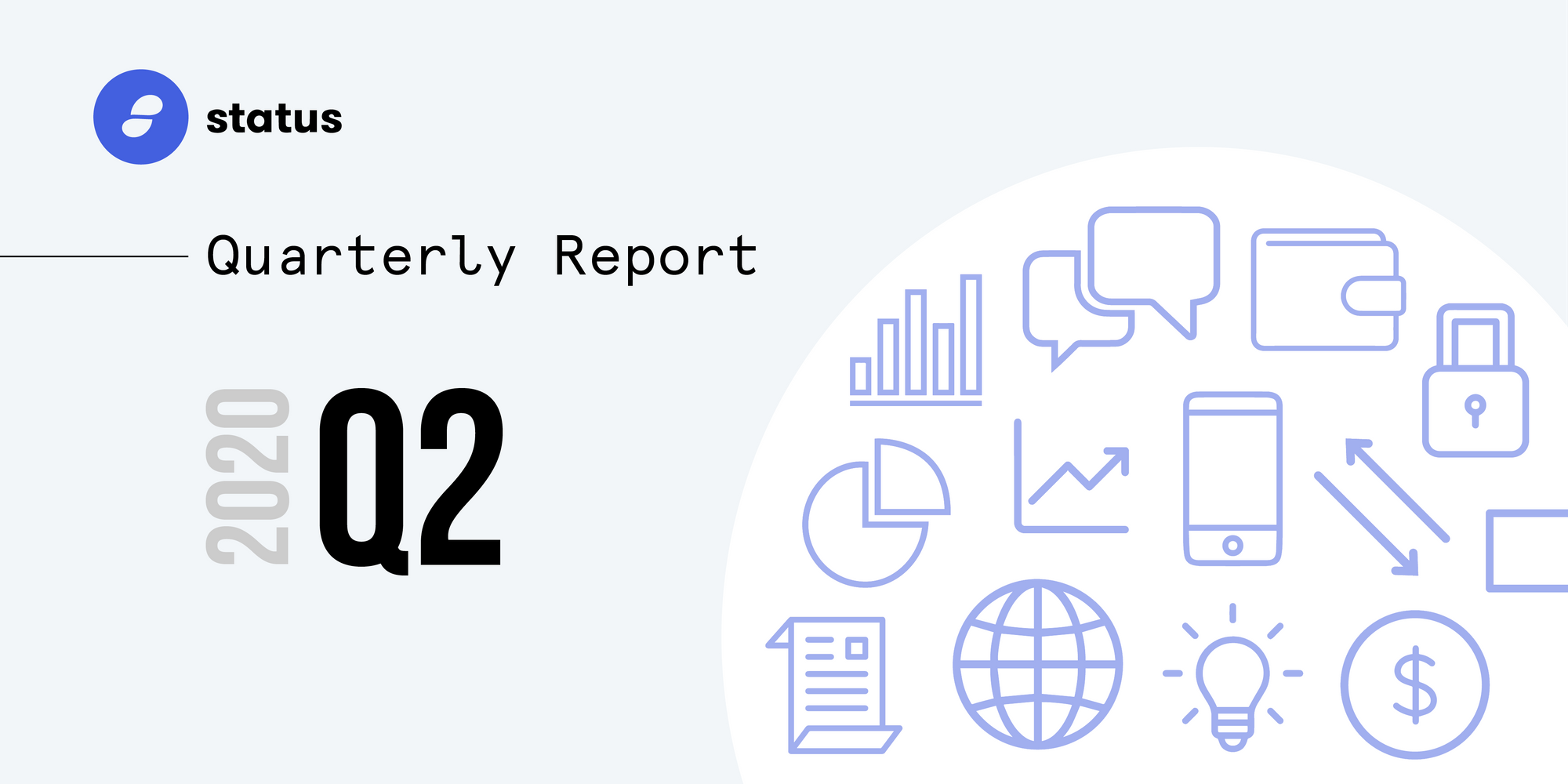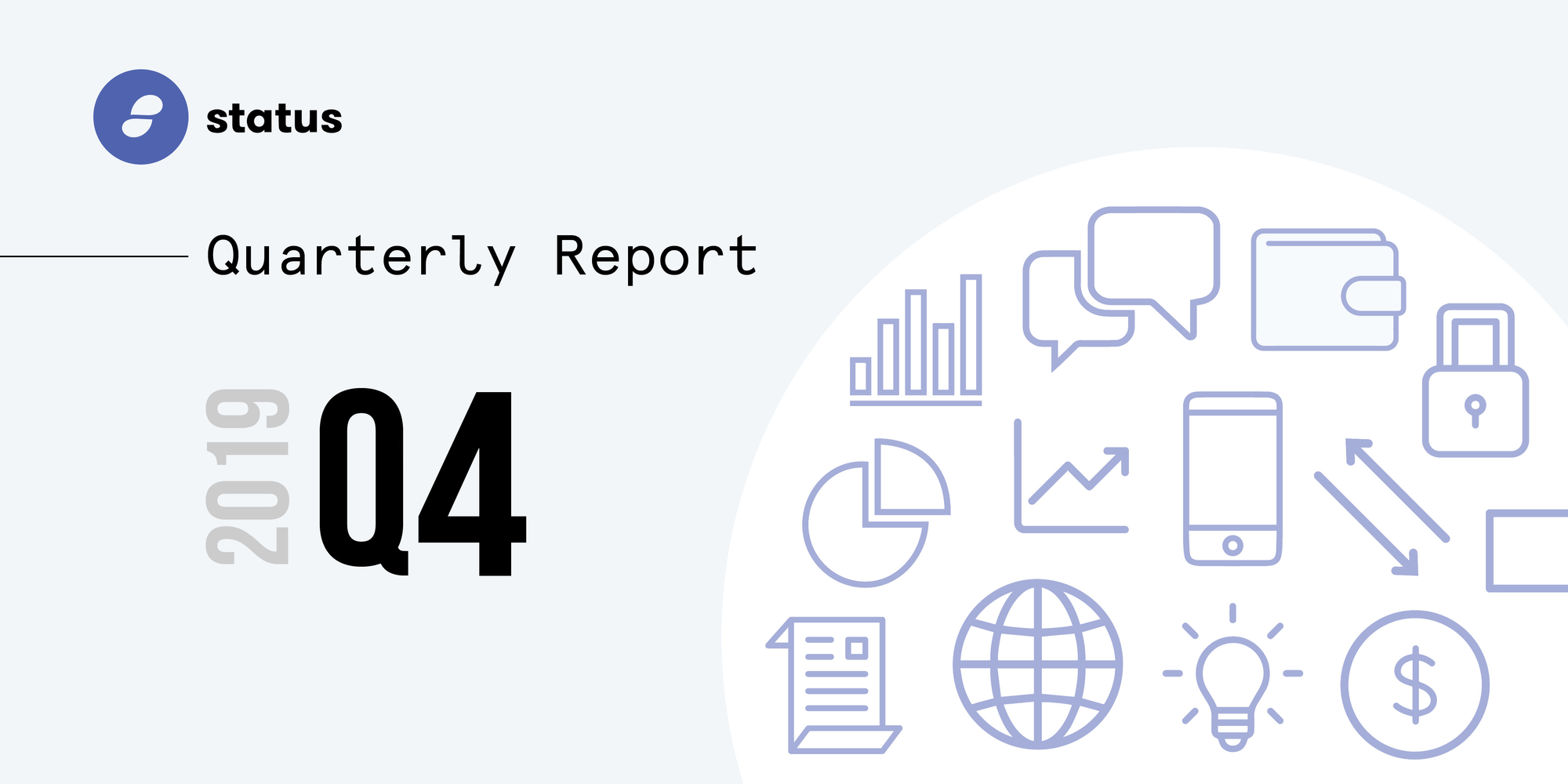The Status Network Quarterly Report - Q1 2020


[Thanks to our wonderful community of translators, you can read this report in Español, Italiano, Deutsch, 中文, 日本語, 한국어 and Tagalog, <3 ]
It’s always a pleasure to write these quarterly reports and have a chance to reflect on all that we’ve worked on, why it means so much to us, and why we’re so excited to continue to push decentralized technology forwards.
This report is written during what might possibly be the most turbulent time externally that we’ve seen yet during this project’s existence. It’s at times like these that the case for upholding human rights comes even more clearly into focus.
With governments bringing about extraordinary measures to protect their citizens, this time of crisis also presents an opportune moment to sneak in excessive censorship and surveillance powers while the world is busy worrying about other things. There’s no doubt these measures have a use for now, but the question remains how much of these rights will be retained once the crisis is over, and what freedom of the average person gets eroded in the long run?
Here at Status, we have always sought to be allies flying the flag for the marginalized, oppressed and censored - that work continues on with passion now more than ever.
Ethereum, and decentralized technologies, are the tools we believe can be used to grant access to all to a fairer web. It’s been great to grow and mature as alongside Ethereum technology itself, and cool to see many other projects in this space flourish too. Shout out to all of you!
Things Ethereum has in 2020 that it did not in 2017:
— vitalik.eth (@VitalikButerin) March 27, 2020
* Uniswap
* https://t.co/wwBUgU78ob
* Status
* MakerDAO
* ZK Rollups (eg. Loopring), >2k TPS capacity
* PoS testnets
* Uncle rates < 10% with 10m gas blocks
* Gitcoin grants
Move the goalposts faster, or else we'll catch up!
As ever, this report will bring you our highlights from around The Status Network, looking back at Q1 2020. Between the time of publishing the last quarterly report and this one, we soft launched v1 of our mobile app, a landmark milestone in our project’s history. Launching off from that moment, we have a ton of interesting plans in the pipeline to create an exciting and engaging user journey through our ecosystem of products, tools, and technology - more info to follow in this report!
Kudos to everyone on the team on the huge achievement which was v1 release. Since then, we’ve followed that up in close succession with releases of v1.1 and v1.2. We currently have ~8k active Android installs and ~9k active iOS installs as at the end of Q1.
So many amazing people have believed in Status and have worked tirelessly to create not just a private, secure, p2p messenger, not just a wallet, or even just a dapp browser, but a super-app for the crypto-native. Today is a good day, thank-you @ethstatus https://t.co/RAUwdhdK8q
— JARRAÐ HOPΞ 厚家睿 (@jarradhope) February 13, 2020
If you’re new to Status and want to understand in plain English how the app works and what it offers, check out our explainer series exploring the big three features of Status - its wallet, chat, and browser.
Let’s look at what’s both already in the mix and upcoming:
V1.1
- Introducing import with private key or seed phrase
- Chat UX improvements
- Updates to ENS display
- Performance improvements
V1.2
- Waku for scalability
- Improvements to wallet fiat price updating
V1.3 will likely include:
- Group chat
- Dark mode
- New, more future-proof webview implementation
V1.4 and beyond…
- Image sending in chat
- Keycard integration
- Push notifications for Android.
This app is made by the people for the people, so get involved anytime by submitting feature requests here, and following along with the product development roadmap here.
We also moved all our v1 specs to `stable` and are working on a SIP process, read more at https://specs.status.im.
Status doesn’t rely on one central server, but on a network of devices to spread information to one another. In this network of devices, each device can be a node. In an effort to boost our node diversity, we created a manual on setting up a node - you can get involved too by following the instructions at the link.
Desktop app development has been on hold while we focused squarely on the mobile app. Heading into Q2, it’s time to pick back up on it. In service of our north star goal of acquiring users into the Status Network, the Embark team has kindly agreed to put Embark development on pause in the interim, to transfer across to the core team working on development of Desktop app.
This is an opportunity to integrate Embark into Desktop, and paves the way to re-integrate extensions with the Embark team now understanding the app on a deeper level.
We’re excited to see what they bring to this new challenge.
Status Network Token (SNT) is the utility token that powers and incentivizes the Status Network.
There are currently 75,866 SNT holders, with 825,693 transfers having been made to date, and a total supply of 6,805m SNT. You can see more token metrics here, as well as our own SNT analytics dashboard over at: https://analytics.status.im/.
Checking in on our SNT utilities both live and in development, we have:
ENS Usernames LIVE
An ENS username is a stateofus.eth handle that users can register by locking up 10 SNT, more human readable than a contact code.
Since v1 launch, users can now register their desired ENS username seamlessly and directly in the Status app, with the ENS name appearing as their display name in chat.
Register a stateofus.eth ENS name in Status for easy searchability. ENS names replace that long hexadecimal hash and make it easy to find friends.@ensdomains names can be registered for 10 SNT from the profile tab in Status. https://t.co/mhdshYbjsi pic.twitter.com/LwJRgEUbHU
— Status (@ethstatus) February 19, 2020
There are currently 3,940 ENS usernames registered by 1,195 owners, with SNT 39,320 locked in the contract.
DApp Discovery LIVE
Dap.ps is a curated list of DApps that relies on a unique economic mechanism to rank information without any centralized authority benefiting.
Work has continued slowly but steadily on V2 which will include:
- 1Putting in place an exchange behind the scenes so you can vote in any token.
- 2An open source subgraph, built entirely with bounties - now any frontend anywhere can fetch ranked data for DApps on Ethereum. #OpenSourceLife.
- 3A rewrite of the frontend to be much more efficient and scalable for future work.
- 4Potentially a total removal of the backend so that it is even more decentralized.
Teller Network DEVELOPED
Teller is a DApp allowing people to exchange fiat for crypto in their neighborhood, becoming a mobile ATM for crypto. The source code and documentation for this project is now live at teller.exchange, and we’re busy security auditing the codebase.
Sticker Market LIVE
Sticker Market is a marketplace for artists and creators to upload and monetize their design work by selling sticker packs directly within the Status app in exchange for SNT.
To celebrate Sticker Market going live in v1 of the app, we held a #stick2web3 sticker contest along with other projects in the ecosystem. Congrats to Mugen Flen on Dogeth, the winning sticker pack!
🥳CONGRAAATS to Dogeth by Mugen Flen– the main #stick2web3 Sticker Pack WINNER! 👏
— picto.eth ✏️ (@pictosis) March 24, 2020
The Dogeth sticker pack will be soon available for purchase and install on the Status app!!!@ethstatus @opensea @MemeFactory0x @ensdomains pic.twitter.com/PGLRYVpejj
We also released a special edition Bufficorn sticker pack to coincide with ETHDenver. Want to see your stickers in Status, and keep 100% of the SNT paid for your designs? Submit them here.
Work is ongoing to integrate Keycard within the Status app, giving users a seamless way to onboard into crypto and sign transactions securely. We’re also working on a proof of concept for a fully decentralized payment network.
Keycard integration into the Status app gets ever closer, with Keycard in-app ready in nightlies. Expect to see Keycard in the app somewhere from v1.4 onwards.
This quarter saw more progress on Keycard for payments, check out the awesome demo video here, along with the proof of concept post with more info.
Production of physical Keycards is one of the areas where we’ve seen most directly the run-on effect of the current coronavirus crisis on our operations in manufacturing and shipping delays. These aren’t critical blockers, just dependencies that we’re working around.
There are so many reasons we’re excited about the possibilities of Keycard -
- 1It’s a physical and tangible deeplink - allowing downloading of Status, opening DApps, referrals
- 2It can be preloaded with assets
- 3It allows for physical marketing of Status - it can be printed and distributed/sold
- 4It’s a secure store of value - true added value for crypto users.
This was a quarter of much change for the Embark team, as we mentioned above. Before we look ahead to the next adventure, let’s take a moment to celebrate the wins of Q1.
Over time, Embark has grown to become a full suite of decentralized app developer tools (encompassing - Embark Framework, Cockpit, Subspace). To reflect this, we launched a website for the newly-named Embark Labs - you can see it here at embarklabs.io.
During the quarter itself, we achieved a number of new releases across the suite:
We also got into publishing fully automated nightly releases to keep the Embark goodness coming.
Always fascinated by the development ecosystem in which we exist, we reached out to the community to get insights into blockchain development as part of our Blockchain Developers Survey. You can see the results here.
Keen to bring decentralized development to an ever wider audience, we created a plugin that makes it easy to compile Vyper contracts in an Embark DApp, we also worked on a smart contract notification service. Love tinkering as much as we do? Check out this guide by @acolytec3 on using Subspace to build a simple DeFi dashboard.
The Nimbus team met in Brussels where they had the chance to do planning work for the months ahead and to launch the first Eth2 testnet running on mobile phones.
The #ethnimbus team is currently meeting in Brussels, playing with the first mobile #Eth2 testnet pic.twitter.com/X4wYql3WEZ
— Mamy Ratsimbazafy (@m_ratsim) February 4, 2020
Steady progress has been made in implementing discovery V5 and improving our beacon chain syncing logic. Our native Nim LibP2P library has seen continuous improvements and it’s now the default network back-end for the beacon node. Nimbus has gained support for the EMVC standard.
We’ve merged BLS changes and are now fully compatible with spec version v0.10.1 - we’re nearly ready for long-standing multi-client testnets. We’ve built a JSON-RPC service that can be used by Beacon explorers to connect to Nimbus, allowing us to monitor the health of a node.
We continued making progress with interoperability, with interop between go-ethereum, discv5 and Lighthouse testnet bootnodes possible. Nim Libp2p continues to stabilize. One of our March targets was completely dropping the go-daemon, which has now been achieved :)
Other interesting problems we’re trying to solve are networking and discovery issues on low-power devices (i.e. mobile phones) and implementation of the honest validator node document.
We’ve been lucky to get help from the amazing @sacha on blog posts, and @tina joined us as our new tech writer. So expect much more frequent Nimbus updates in future, and loads of neat guides on things like using Nim-libp2p for creating p2p chat.
Want in on the fun? We relaunched our bounty program, so head over to our GitHub to get involved, or drop by our Discord server to chat with the team.
This quarter we released both specs 0.3 and 0.4, for Waku (a fork of the Whisper protocol), and moved closer to integration with Status mobile app.
Waku spec 0.4 released! Implementation matrix; packet code option changes; deprecate old fields; increase topic capacity to 10k. Getting closer to integration into the @ethstatus app...https://t.co/bueiN4ZG7a
— vacp2p (@vacp2p) February 21, 2020
Waku is a fork of Whisper (EIP-627), optimized for better usability for resource restricted devices, e.g. mostly-offline bandwidth-constrained smartphones. It works via light node support, historic messages, expressing topic interest, and rate limiting. The big trade-off to acknowledge here is the sacrificing of metadata protection for scalability, however we feel it’s one worth making in the interim while a better long term solution is researched.
Both Nimbus and Status-go clients implement Waku, you can find out more details on what each client supports here.
Outside of Waku efforts this quarter, we investigated discv5’s ability to function efficiently on resource-restricted devices, researched DNS-based discovery, and did some work on mapping components for the Status app.
In the build-up to release of v1 of the mobile app, it was a busy quarter for the marketing team, developing content and campaigns to reach and educate users.
Campaigns
In our quest to bring Ethereum and the world of DeFi to mobile devices, we launched a DeFi campaign.
We reviewed some of the most exciting Dapps in DeFi that can all be accessed using the Status mobile app, including: Tottle Swap, Aave, Compound Finance, PoolTogether, Uniswap, Money Legos, Zerion, Defi Zap, and Sablier.
Mobile #DeFi : Advanced financial tools in your pocket brought to you by @ethstatus
— State of the DApps (@StateOfTheDApps) February 27, 2020
So many tools right at your fingertips!☝️☝️☝️https://t.co/AFvx4GugHK #Ethereum #BlockChainNews
Blog
We published 37 blog posts/articles on our.status.im in Q1 2020, with posts contributed by diverse authors from our community of ambassadors, collaborators and core contributors.
Our best performing blog posts were:
In The News
Corey featured on Coindesk’s look at remote work’s unanticipated role in the pandemic. We also got a write up on Waku and Status on CoinTelegraph.
Hackathons
The prize explorer for #TakeBackTheWeb Virtual Hackathon goes live in just a few hours!@ethstatus, @metamask_io, @etclabs, @blockstack, @infura_io, @wearekickback, @ethereumecf, and @SablierHQ are joining the party to kick off 2020 with us 🥳
— Gitcoin (@gitcoin) January 8, 2020
Join now👇https://t.co/TkCrM52B4V
With Q4 2019’s quarter closed out on the books, here’s what was spent in 2019 to fund the project, as well as a look at our treasury position
| Expenses ($1,000s) | Q1 2019 | Q2 2019 | Q3 2019 | Q4 2019 |
|---|---|---|---|---|
| Salaries, core contributor fees & individual expenses | $1,900 | $1,800 | $1,700 | $1,882 |
| Third party vendors | $100 | $200 | $300 | $620 |
| Marketing & sponsoring | $50 | $50 | $40 | $161 |
| Reserves ($1,000s) | Q1 2019 | Q2 2019 | Q3 2019 | Q4 2019 |
|---|---|---|---|---|
| ETH & USD holdings | $30,000 | $57,000 | $34,000 | $23,000 |
[For ease of reference, we’ve shown our financial data in this report in USD. When putting together this information, we used the following Coingecko exchange rates to convert ETH balances:
- Q1 2019, 31/3/2019, 1 ETH = ~$142
- Q2 2019, 30/6/2019, 1 ETH = ~$321
- Q3 2019, 30/9/2019, 1 ETH = ~$180
- Q4 2019, 31/12/2019, 1 ETH = ~$129.]
We started the quarter planning to enter into a growth fundraising round; as the quarter progressed and the global economic outlook became more bleak, we decided to put those plans on hold until the timing felt more appropriate.
We have fiat reserves in the bank in place to cover our operating costs into 2021, and as such, we’ll pick back up on fundraising later in the year.
Having been through crypto’s version of a recession in recent memory, we’re duly accustomed to operating during externally challenging periods, and being prepared for unforeseen circumstances. As such, we continue in business-as-usual mode, forging ahead with our plans without major disruptions foreseen.
Introducing Assemble Beta – the latest product from The Status Network. Assemble is a community, owned peer-to-peer crowdfunding tool aimed at supporting web3 projects.
— Status (@ethstatus) January 16, 2020
Learn more about Assemble and how you can support projects or get your work funded https://t.co/WEgPaesS60
Assemble is our implementation of a decentralized funding platform - a place where projects can request funding, and any funders can pledge funds. It’s transparent, permissionless, and 100% of funds pledged are received by the recipient.
Q1 2020 kicked off the beta launch of assemble.fund, with a pilot to run some projects through the platform, test for bugs and gather feedback. The pilot went smoothly, and a first round of projects was funded. The next step will be to integrate Assemble more tightly into our overall governance, using plugins from Discuss to allow the community to give input on development of the Status Network.
A few conferences took place in the earlier part of Q1, with EthCC marking the last time in probably quite some while that we’ll get together in person. We don’t foresee any chance of in-person conferences happening in the near future which is why we will be shifting our attention to virtual events and webinars. Stay tuned!
Our awesome core contributors represented and presented Status at the following events:
- Paris P2P Festival - Mamy gave a talk about why mass adoption of P2P tech will happen in countries in crisis.
- NFT.NYC - Graham gave a talk on Status and also hosted a party to celebrate our Sticker market launch.
- NonCon2020 - Status was one of the sponsors of the #noncon2020 virtual event; Guy - Louis presented Keycard and gave a talk on why smart cards matter in crypto and how they can be used.
In case you missed it, here are @DeanEigenmann & @oskarth presenting Waku by @vacp2p at #ethcc last week in Paris.
— Status (@ethstatus) March 11, 2020
Waku is a fork of Whisper designed to address some of Whispers shortcomings for private, censorship resistant communication. https://t.co/mh0UfeBiRv
Core contributors and ambassadors also participated and hosted a handful of events.
- We sponsored the 2nd Virtual Reality Concert in CryptoVoxels. Status ambassador Lilsiri performed a live concert at the event.
- Status Ambassador Albed hosted a community meetup in Yogyakarta, Indonesia. Web3 enthusiasts gathered to get hands-on experience of how Status is used for secure communications.
Less than 24h until our @cryptovoxels party starts 😃
— CryptoWiener (@CryptoWiener_) March 13, 2020
We will have live concerts from @ethgang, @DAOrecords_, @AustrianApparel and W.A.Mozart on the piano. 🤘🔥
+PLUS a lot of other fun activities and giveaways!
Join our discord to get free goodies https://t.co/Fo0kyfWBYD pic.twitter.com/4QJeV86irG
It’s been really fascinating to us in this quarter to see how the world’s largest remote work experiment has played out. We’ve been 100% remote since day one, and have always been advocates for async and distributed work.
This quarter, we’ve been talking to many publications to share our tips and best practices for effective remote working. If you ever want to bounce ideas with us, drop by any of our communication channels for a chat - we’d love to hear from you.
Shipping products with distributed teams is a Status specialty. Read about how the rest of the world is learning about the future of work, with insight from our own Chief Security Officer @Corpetty.https://t.co/0BgGZ1xXAa
— Status (@ethstatus) April 3, 2020
On the team side of things, we achieved our aim of increasing our headcount slightly in Q1 2020 for critical knowledge gaps, hiring in marketing and engineering roles. We don’t plan to significantly grow our headcount in the near future, and the bulk of any hiring activity will be to replace outgoing contributors. We’re looking forward to building up our decentralized application platform team, with two new hires in the pipeline for protocol and distributed networking engineering.
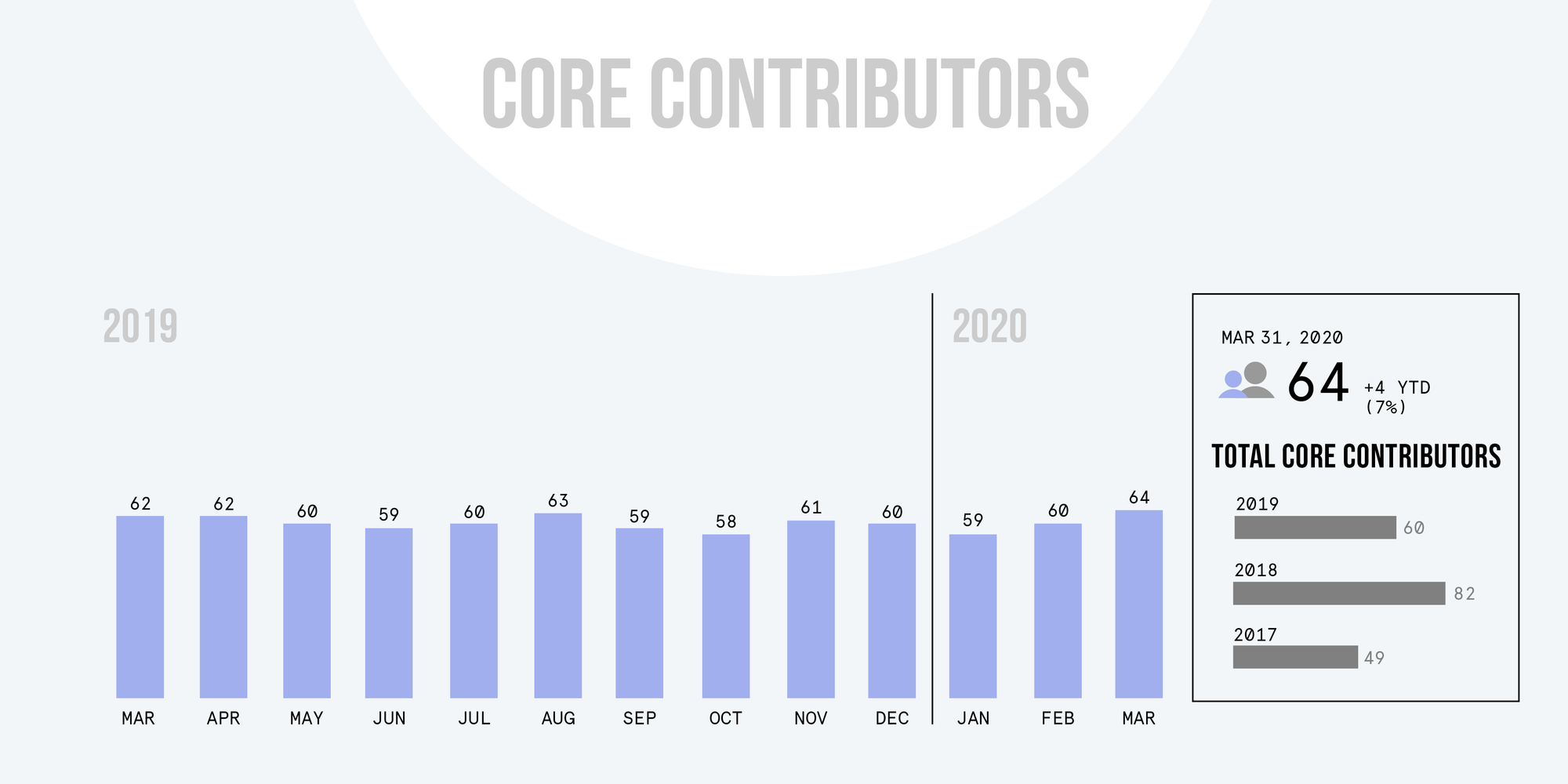
Turnover saw a spike at the start of the year (mirroring last year’s cycle where January typically sees higher than usual attrition):
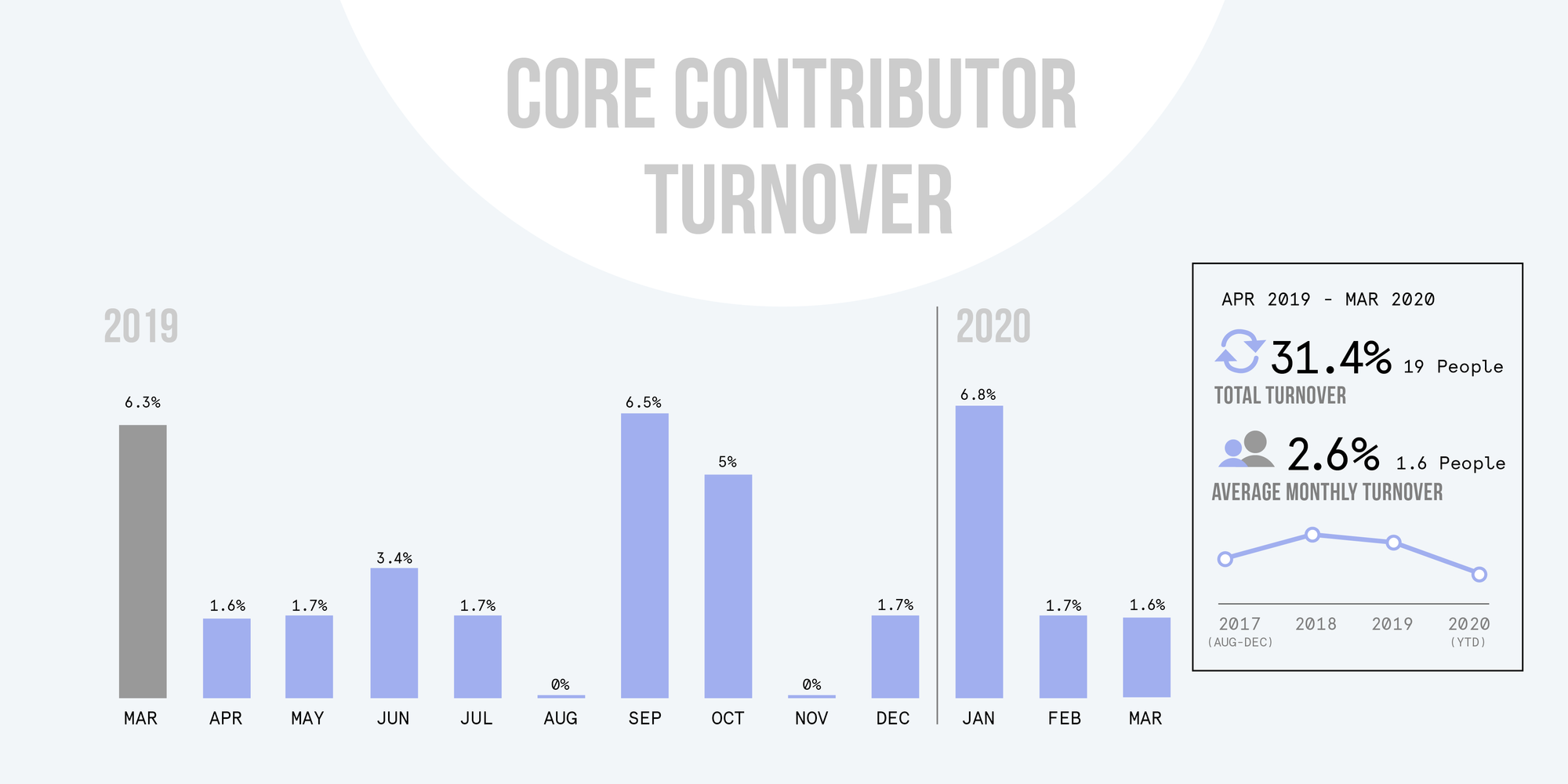
During Q1, we said goodbye to six core contributors (@rajanie, @JB, @andrei, @iurii, @pedro, & @jacques), and welcomed the following new core contributors to Status:
- Simon - growth marketing manager
- Viktor - Nim developer
- Tina - Tech writer for Nimbus
- Tobias - security engineer
- Giovanni - protocol engineer
- Pepper - recruiter
Shout out to @shiraz who helped us out during a recruiting busy season with technical recruiter expertise, and @oliver with interim support managing growth marketing campaigns.
In Q1 2020, we had 13 new ambassadors joining the Ambassador Program. The current number of active ambassadors is now at 32 (two more than in Q4 2019), with representation across 17 countries - our most diverse lineup yet.
Ambassadors completed 57 tasks (12% more than Q4 2019) in Q1 2020, broken down by category into: events (3), content (39), community building (5), and technical (10) 🎉
Some highlights from the program in Q1 2020:
- Acolytec3 was responsible for some of our best performing content on our.status.im, writing posts about Subspace, and building Nimbus on Android.
- Ambassadors helped in translating Status into Spanish, Italian, French, German, Arabic, Indonesian and Portugese.
- Status Media was an ambassador-created concept that launched this quarter - a home for community members to share their voices via their own self-made podcast series. Some of the series available are: #EverythingStatus Podcast, Ken-Crypto Bee, Status Korean Podcast, and the Onwrd Podcast.
"I joined Status Ambassadors because I think that crypto space is a community driven industry rather than traditional corporate / startup."
— Status (@ethstatus) March 30, 2020
-@DanielWeinzveg, Status Ambassador
Become a Status Ambassador and be an integral part of our community: https://t.co/0nmm4NITV6 pic.twitter.com/KSZP1xjDOA
Our favourite bit of the report - where we get to say thank you to some of the multitude of people that make Status what it is. Huge kudos this quarter to:
- Our amazing and seriously talented core contributors. The powerhouses that drive Status forward, working day and night behind the scenes to bring the vision to life.
- All our talented polyglots that helped translate the Status website and app into a multitude of languages. We’re more global and more local than ever before thanks to all of you <3
"v1 is an example of what can be achieved by the vision of a decentralised app platform realised by Ethereum v1 & publicly marks our new direction into tackling the infrastructural issues faced from both a privacy perspective & resource constrained environments" – @jarradhope pic.twitter.com/ix00u0QYVX
— Status (@ethstatus) February 18, 2020
With Status v1 launched and the first mobile Ethereum gateway now in the hands of real users, Q1 has marked a turning point from laying the foundations to looking ahead to inviting users into our world. We’re excited to connect with both the crypto & security communities we know well, and mainstream users beyond that for whom blockchain technology is still maybe unknown.
On the product side of Status, Q2, and likely most of 2020, will be a continuation of Q1’s focus on better serving and engaging users.
Our goal is to build ways for them to benefit from this decentralized tech. Whether that’s buying real world goods in crypto by tapping Keycard at a point of sale, or sending funds across borders seamlessly to friends, there are so many interesting use cases that we hope to help users realize. In parallel, we’ll continue developing more SNT use cases so that the network’s value and utility to users grows.
Our research efforts will continue, aiming to answer the most pressing problems that we encounter when making our products - how to ensure messages stay private in hostile environments? How to guarantee the tech can run on mobiles where battery and data are limited? How can we make messaging richer by allowing people to send files and images?
We’re not only interested to know the answers to these questions for ourselves. We believe our research work, allowing us to essentially rebuild the perfect p2p infrastructure from the ground up, will be beneficial to the broader ecosystem. We’re working to fine tune mechanism design and network incentivization in anticipation of this goal.
Decentralization has always been a central idea to us. That means not just the tech we use and develop, but also how Status is operated and governed. We’re currently working on plans to merge all the disparate governance modules we’ve created (Voting DApp, Assemble, Staking DAO, etc.), opening up the gates for community involvement in Status. We’ll share more on that in the coming weeks.
We’ve always believed that Status can be the perfect tool for supporting sovereign communities. We plan to work with marginalized communities to help transition them into free socio-economic networks. This work has been put on hold while travel restrictions are in place, but expect us to return to this later in the year. More info to follow.
Thanks for reading this report, we’re always excited to tell you about the work we do. Here’s hoping you, your family, and your communities are staying safe. Take care! - your friends at Status.
Translations
A huge and heartfelt thank you to those who helped translate this report, you make a huge difference by helping us reach more people with the message!:
- Russian: TBA
- Tagalog: Ken | kencrypto.whisperer@gmail.com | @kenberey
- German: Oleksandr Zilber | mercuriosilber@live.de | @OleksandrZilber
Disclaimer / fine print
This report was made for your entertainment, and we’d ask you not to rely on it for any other purposes, e.g. making investment decisions. Just to be super transparent, we want to highlight that:
- Token metrics info is an estimate supplied by a third party, given for illustrative purposes. We have not independently verified or fact checked this data.
- Status financial information provided is estimated based on data available in April 2020 and may change due to intercompany chargings or ongoing updates in accounting. Numbers have been rounded for ease of presentation.
Thanks for your understanding!
